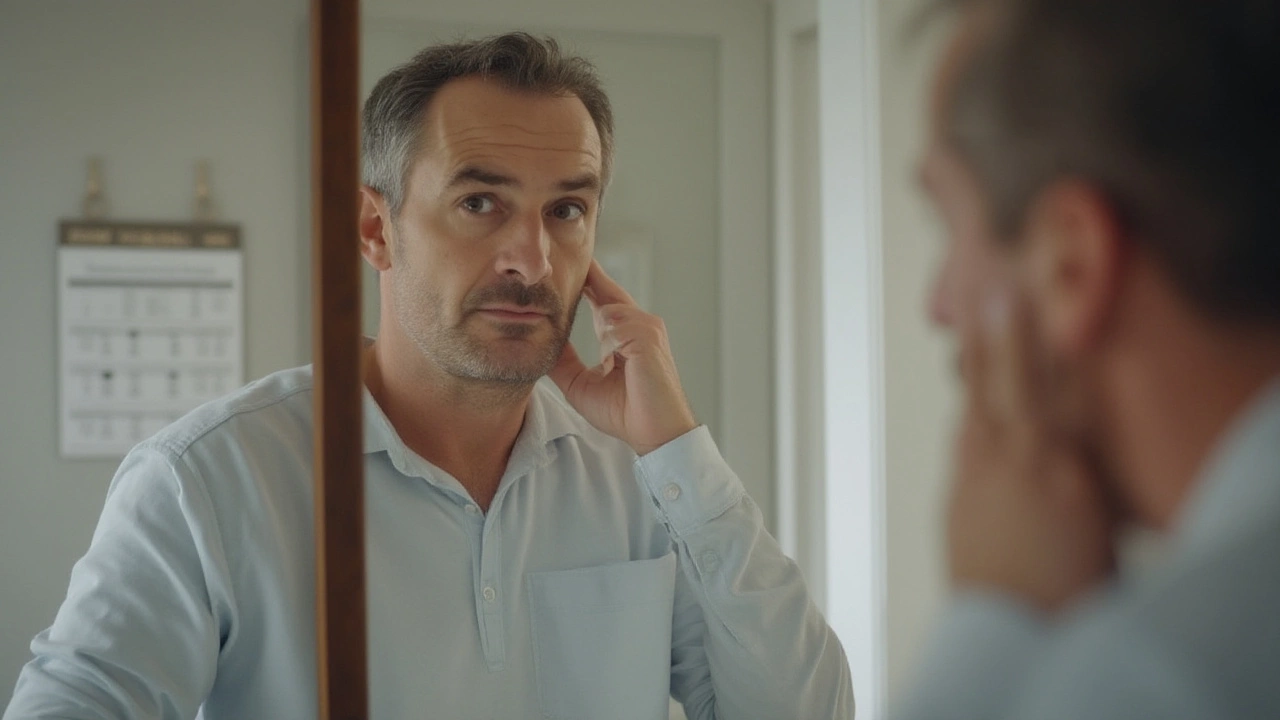It’s a quietly rising concern among modern men — and not just for those edging into middle age. Testosterone, often thought of as the hallmark of masculinity, shapes not just our physique and confidence, but our energy, resilience, and pleasure in everyday pursuits. Yet, the early signs that something’s amiss are hardly as cinematic as movies would have you believe. The truth is, low testosterone isn’t about dramatic overnight changes. It’s about subtle signals, the ones that can slip under your radar as you chalk them up to stress, poor sleep, or just ‘getting older.’ Before any man resigns himself to feeling off-colour, knowing these early signs and, even more crucially, what to do next, can make all the difference between thriving and merely coping.
Recognising the Early Signs: Subtle, Yet Significant
Low testosterone, or hypogonadism, rarely announces itself with a fanfare. More often it creeps in with muted changes that blend into the background of a busy life. The classic symptoms you might expect — such as noticeable muscle loss or dramatic mood swings — are just the tip of the iceberg. It usually starts far more subtly:
- Persistent Fatigue: Perhaps you’ve noticed you need a double espresso to get started in the morning and still feel flat by mid-afternoon. This isn’t just garden-variety tiredness; it’s a kind of all-day energy dip where no amount of rest feels restorative.
- Low Mood or Motivation: Spirits dip for many reasons, but a gradually emerging apathy or sense of ‘can’t be bothered’ can signal hormonal changes, not just a rough week at work.
- Loss of Focus: You sit at your desk, stare at your laptop, and somehow spend forty minutes reading the same email. When mental sharpness turns fuzzy and your attention span feels much shorter than it used to be, hormones could be a silent culprit.
- Decreased Strength or Less Recovery: Getting up from a squat with your own bodyweight feels more laboured than before, and aches seem to linger longer after exercise. These aren’t just invisible signals of ageing; declining testosterone slows muscle repair and protein synthesis.
- Changes in Libido: This isn’t just about the bedroom, but also about a more general interest and vibrancy in relationships. If your drive weakens for weeks or months, it can be a marker that your body’s testosterone levels are on the slide.
- Poor Sleep, Night Sweats: If tracking sleep with a wearable or noting more restless nights — this, too, can emerge with hormone dips. Night sweats, though less discussed among men, sometimes point to shifts in testosterone levels.
- Changed Body Composition: The scale may barely budge, but a redistribution — softer around the midsection, a touch more fat than muscle — is a common, early hormonal change. If you used to maintain your shape with little effort but suddenly feel you can’t keep the same definition, hormones may be involved.
- Irritability or Impatience: Some men notice irritability or a shorter temper in situations that never used to provoke a reaction. This moodiness can be dismissed as stress, but chronic hormonal imbalance often underpins emotional volatility.
Interestingly, early changes may look different depending on your individual baseline and lifestyle. A naturally energetic man might notice the slowing-down effect more acutely, while someone who thrives on structure could experience mental fog as especially disruptive. No two guys experience the warning signs exactly the same way. What’s key is recognising that the symptoms are often greater together than in isolation — a constellation of subtle shifts rather than one dramatic symptom.
There’s also a genetic element at play. A study from King’s College London in 2023 found that men with a family history of early-onset hypogonadism were twice as likely to report early symptoms before age 40, but most never realise until it’s advanced. Ageing does play a role, yes — testosterone declines about 1% per year after age 30 — but environmental and lifestyle factors (chronic stress, poor sleep, poor diet, alcohol) accelerate the process in men as young as 25.
For anyone who values resilience in body and mind, ignoring these signals comes at a cost: you risk not just your physical health, but also confidence, relationships, and daily productivity.
Let’s break down just how widespread certain symptoms are. According to NHS data published in late 2024, here’s how common the early symptoms can be:
| Symptom | Prevalence (% of men reporting, ages 25-55) |
|---|---|
| Persistent fatigue | 64% |
| Low mood / apathy | 41% |
| Loss of focus / mental fog | 33% |
| Reduced strength / muscle mass | 27% |
| Decreased libido | 38% |
| Poor sleep / night sweats | 17% |
When several of these symptoms crop up together, they’re well worth a closer look. Watch for the patterns and don’t write them off as just part of a busy modern life — or the British weather.
For those wanting a visual reference, a classic image here would feature a man in a tailored navy suit at a modern desk, his expression calm but reflective; not slouched or defeated. It’s the poise of someone quietly noticing the difference between struggling and thriving.

Why Testosterone Matters Beyond the Obvious
Some chaps still think testosterone is all about muscles, bravado, or sex drive. Elegant understatement: it’s much more. This hormone’s influence threads through an impressive roster of functions, each contributing silently to how you think, work, and feel.
Testosterone helps regulate red blood cell production, supports cholesterol balance, and even modulates your response to stress. Lower levels are gradually associated with increased risk for type 2 diabetes, heart disease, and even certain forms of depression. Those moments of sharp decision-making in tense meetings? They’re partly fuelled by testosterone’s effect on neurons and synapses. Nightly repair after a tough gym session? Again, testosterone quietly does its job in the background.
New research from University College London, published early this year, linked declining testosterone with a greater risk of memory problems by the late 40s. Subtle cognitive shifts, not just ‘senior moments,’ can trace back to hormonal changes. It’s a far cry from the stereotype that only older men need to care.
And then there’s confidence. Not the superficial, brash kind, but the grounded assurance you carry into a client meeting or across a dinner table. Low testosterone can quietly sap that edge. The difference is often less about what you say and more about how you carry yourself. Men with healthy testosterone usually report faster recovery from setbacks, more consistent effort across tough work weeks, and a steadier sense of motivation—habits associated with a long, productive career and a satisfying home life.
Let’s touch on relationships as well. Partners might notice subtle changes long before you do — a withdrawal from intimacy, reluctance to make plans, or just a loss of that old spontaneous spark. Given that many men are naturally inclined to ‘push through’ and say nothing, the early warning signs often first come from those closest to us.
Taking these signals seriously isn’t about chasing youth but about protecting quality of life. Data from the British Medical Journal shows that men who address low testosterone in its early stages — through lifestyle, medical, or combined approaches — report a 22% improvement in life satisfaction metrics over five years compared to those who ignore the warning signs. Those numbers aren’t flashy, but for a gentleman who prizes consistency, vitality, and presence, they quietly speak volumes.
Visualising this: imagine an elegant shot of a modern grooming set on a marble countertop, next to a watch and leather folio — a nod to the hormone’s myriad support for everyday routines, from morning prep to meetings and evening recuperation.

Next Steps: How to Address Low Testosterone Like a Gentleman
The best step isn’t a knee-jerk dash toward testosterone replacement therapy (TRT). Start with a moment of honesty. Are you ticking several of the subtle symptoms described above, and do they noticeably disrupt your sense of well-being, productivity, or presence? If so, first resist the urge to self-diagnose through internet quizzes or generic supplements.
The gold standard is a thoughtful discussion with your GP or a men’s health specialist, ideally after keeping a symptom journal for at least two weeks. Bring notes—this isn’t overkill. GPs appreciate when you come with detailed accounts. Blood tests (usually taken early morning) can confirm your testosterone status and prompt a wider look at thyroid, vitamin D, and cortisol, which all influence energy and mood.
For men who want to optimise naturally first, the basics still matter — though perhaps with more urgency than many realise. Here’s where small, daily disciplines compound into quietly excellent results:
- Prioritise weighted resistance exercise: Compound lifts (deadlifts, squats, rows) three times a week are proven to nudge testosterone upwards, while also protecting lean muscle.
- Protect 7–8 hours of sleep:
- Reduce stress loads: Focus on a calm, well-ordered daily routine. Even ten minutes of daily mindfulness or breathing practice can lower cortisol, which drains testosterone.
- Eat for hormone health:
- Good fats (olive oil, nuts, eggs), leafy greens, lean proteins, and shellfish (rich in zinc) all support hormone production. Excess processed food, sugar, and alcohol, by contrast, undermine it. A small detail: vitamin D deficiency (widespread in the UK) correlates directly with low testosterone. A daily D3 supplement may help.
- Shed excess weight:
- Even a two-stone drop (about 12kg) can significantly boost testosterone in overweight gents, as body fat converts testosterone into oestrogen.
- Curate your environment:
- Avoid plastics and chemicals known as endocrine disruptors; opt for glass or stainless steel for water, and check personal care for parabens or phthalates.
If these basics don’t move the needle after 3–6 months—and blood work remains low—further medical conversations may be warranted. Modern TRT, properly supervised, can be transformative, but demands careful ongoing monitoring of heart, prostate, and blood health. The point is: a man’s approach should be precise and measured, not rushed or impulsive.
Finally, let’s put context to the journey. Recognising early warning signs and responding actively isn’t a confession of weakness, but a statement of intent — to stay vital and engaged through every decade of life. The modern gentleman remains proactive not for vanity, but for the sake of leadership, presence, and legacy.
For visual balance, imagine an elegant photograph of a man suiting up for a fresh day — crisp shirt, strong jaw, thoughtful gaze in the mirror — quietly ready for what comes next.
Low testosterone isn’t the end of the line; it’s often a subtle invitation to raise your standards and reclaim your edge with intention and style.

